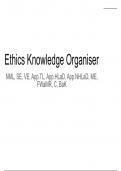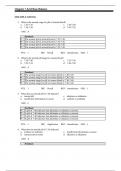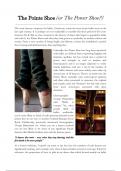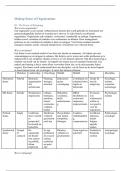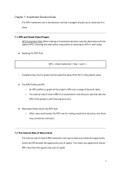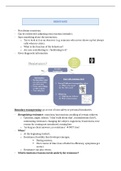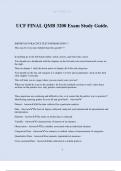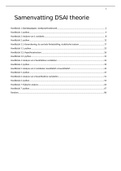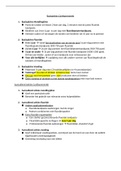Ethics Knowledge Organiser
NML, SE, VE, App.TL, App.HLaD, App.NHLaD, ME,
FWaMR, C, BaK
,Natural Moral Law - Aquinas
Primary and Secondary Precepts Other Responses: Manualism
Aquinas believed humans, by nature are disposed to do good (fulfils purpose). The primary Secondary precepts were compiled in “manuals” – huge books with lists of specific rules. This
precepts list fundamental goods to which all humans are disposed. Obeying these leads to had the effect of making ML more deontological, as there are more specific rules to follow. It
eudaimonia. Aquinas’ 3 precepts were then divided into 5: also provided wider guidance on specific ethical issues.
[W-Worship God] [O-Ordered Society] [R - Reproduce] [L-Learn] [D-Defend Innocent]
From these precepts, specific rules can be derived from human reason, hence, these Strengths of Natural Moral Law
guidelines become deontological rules that cannot be broken. (Secondary) It helps people to establish rules that everyone can follow in every society.
It is a universal system because it relies on reason that everyone has.
Proportionalism (Hoose and McCormick) The precepts are also commonly accepted by everyone: everyone wants to preserve life, live
NML can lead to unloving circumstances due to its hard-line deontological approach. in society, etc.
Proportionalism says it is never right to go against a principal unless there is a proportionate Supports human rights and equality which are important in today’s society.
reason that would justify it. It allows people to be moral and stand firm on issues.
There are no intrinsically evil acts. Two things should be taken into account - the intention, Secondary precepts are a day-to-day guide on what is right or wrong.
and the value of the good effect against the disvalue of the bad. It is related to human nature and how humans think and feel.
The Principle of Double Effect
You can cause harm as an unintended but foreseen side effect (“double effect”) of bringing
Weaknesses of Natural Moral Law
about a good result, as long as the harm is not intended. EG: when medical action must be Reason does not seem to be universal - Other cultures have very different standards: e.g. in
taken to save a pregnant woman’s life. As long as the first action was good according to the some Inuit and Native American cultures the old/young that cannot make it through the winter
precepts it is still acceptable. are killed or left to die.
It is outdated: e.g. in today’s society, a moral system that argues that it is ‘unnatural’ to be a
Strengths of Double Effect homosexual is disregarded.
Allows people to adapt to extreme circumstances. Not everyone believes in God which poses a big problem to NML.
Resolves some problems of deontology: if an action is always right or wrong it may cause Vardy has criticised how Aquinas jumps from the primary precepts to the secondary precepts:
people to do things which cause harm to others. although sexual acts are important to continue the human species, it is unnecessary for every
People can respond to extreme circumstances by acting in a way that has a good intention emission of semen to be for procreative purposes, even if people masturbate occasionally the
and a bad secondary consequence. human species can still be continued.
Aquinas could have got some of his assumptions wrong: e.g. sexual organs could be primarily
Weaknesses of Double Effect for pleasure and secondly for procreating.
The Intention doesn’t matter, if a bad consequence comes about then the action is still Aquinas’ account of the human nature is too simplistic: now that we have advances in science
morally wrong. and psychology we know that it is much more complex than he suggested.
People who argue that the consequences of an action show if it is right and wrong reject
Double Effect because the bad consequence still happened.
There is also a problem in judging the ‘intention’ of an action: no one knows if someone’s
intention really is good or bad – their intention may be to bring about the bad effect the
whole time.
, Natural Moral Law Applications Euthanasia/Assisted Suicide:
For: Pain killing drugs may be administered to someone which have the accidental
Theft And Lying secondary effect of ending their life (this could be considered ‘Passive Euthanasia’).
Goes against the primary precept “live in society”. Goes against the secondary precept in the Against: Self preservation is a primary precept.
10 commandments (Exodus 20): Do not steal & lie. Is outlawed in Divine Law as it is in the Divine law outlaws suicide.
Bible. Catholic tradition views suicide as an unforgivable sin.
The theory is deontological so it is never right to do something immoral even for a good
reason (so stealing/lying to help others is wrong). Aquinas argues that theft/lying is always
Capital Punishment:
wrong in the Summa Theologica. For: Aquinas is in favour of CP as it maintains order and justice in society, meeting the primary
precept. (+ part of Aquinas’ context)
Exceptions: CP is allowed in the Bible – “an eye for an eye. A life for a life.”
Theft: In cases of extreme need (e.g. starving to death) the act of taking food that belongs to The precept to preserve life only depends on preserving innocent life, and those who are
someone else would not be classed as theft. This is because the food becomes the property convicted of a capital crime are not innocent.
of the person in need, not the person who has enough. Against: Precept to preserve life.
Lying: There are some lies that Aquinas would argue are non-malicious and not immoral. If
Embryo Research
one has to lie to save a life, Aquinas suggested that the best course of
For: Can be used to preserve life, e.g. through eradicating genetic diseases – this is the
action is to “keep back the truth” rather than directly lie. However, a malicious lie is always
Synderesis principle.
wrong.
Against: Life begins at conception, so the embryo is considered to be a fully human person.
Any research that discards embryos is murder.
Animal Rights Reproduction should be natural (no IVF).
Aquinas agrees with Aristotle who sees creation as containing a “hierarchy of souls” – with
plants at the bottom and humans at the top. Humans are above animals in the hierarchy, as Designer Babies
they can reason. Aquinas argues that animals are “things” used to help us reach Eudaimonia. For: Can be used to preserve life –e.g. Making a “saviour sibling.” This could even be
God placed humans above animals in creation, meaning that they can use them for their argued from the perspective of Double Effect.
purposes. Aquinas would allow animals to be used in most ways to support humans – even Against: It is wrong to play God, this goes against the primary precept worship God.
blood sports, as this was a common pastime in his context. As there’s emphasis on things Reproduction should be natural.
being “natural”, this means Aquinas may not support scientific uses of animals, like using It would be wrong to raise a child thinking it is special as it has been designed, going against
them in organ transplants for humans, as this goes against God’s intended order for creation. the primary precept to educate children.
Abortion Cloning
For: To save the life of the mother in the case of Double Effect. For: Therapeutic cloning can be used to create stem cells which can be used to help treat
Against: Life begins at conception (Divine Law) / Preserve life is a primary precept and do not fatal diseases such as leukaemia.
kill is a secondary precept. / Catholic: abortion is always wrong. Against: It is wrong to play God, this goes against the primary precept worship God.
Reproduction should be natural.
Any cloning that destroys embryos is murder because life begins at conception.
NML, SE, VE, App.TL, App.HLaD, App.NHLaD, ME,
FWaMR, C, BaK
,Natural Moral Law - Aquinas
Primary and Secondary Precepts Other Responses: Manualism
Aquinas believed humans, by nature are disposed to do good (fulfils purpose). The primary Secondary precepts were compiled in “manuals” – huge books with lists of specific rules. This
precepts list fundamental goods to which all humans are disposed. Obeying these leads to had the effect of making ML more deontological, as there are more specific rules to follow. It
eudaimonia. Aquinas’ 3 precepts were then divided into 5: also provided wider guidance on specific ethical issues.
[W-Worship God] [O-Ordered Society] [R - Reproduce] [L-Learn] [D-Defend Innocent]
From these precepts, specific rules can be derived from human reason, hence, these Strengths of Natural Moral Law
guidelines become deontological rules that cannot be broken. (Secondary) It helps people to establish rules that everyone can follow in every society.
It is a universal system because it relies on reason that everyone has.
Proportionalism (Hoose and McCormick) The precepts are also commonly accepted by everyone: everyone wants to preserve life, live
NML can lead to unloving circumstances due to its hard-line deontological approach. in society, etc.
Proportionalism says it is never right to go against a principal unless there is a proportionate Supports human rights and equality which are important in today’s society.
reason that would justify it. It allows people to be moral and stand firm on issues.
There are no intrinsically evil acts. Two things should be taken into account - the intention, Secondary precepts are a day-to-day guide on what is right or wrong.
and the value of the good effect against the disvalue of the bad. It is related to human nature and how humans think and feel.
The Principle of Double Effect
You can cause harm as an unintended but foreseen side effect (“double effect”) of bringing
Weaknesses of Natural Moral Law
about a good result, as long as the harm is not intended. EG: when medical action must be Reason does not seem to be universal - Other cultures have very different standards: e.g. in
taken to save a pregnant woman’s life. As long as the first action was good according to the some Inuit and Native American cultures the old/young that cannot make it through the winter
precepts it is still acceptable. are killed or left to die.
It is outdated: e.g. in today’s society, a moral system that argues that it is ‘unnatural’ to be a
Strengths of Double Effect homosexual is disregarded.
Allows people to adapt to extreme circumstances. Not everyone believes in God which poses a big problem to NML.
Resolves some problems of deontology: if an action is always right or wrong it may cause Vardy has criticised how Aquinas jumps from the primary precepts to the secondary precepts:
people to do things which cause harm to others. although sexual acts are important to continue the human species, it is unnecessary for every
People can respond to extreme circumstances by acting in a way that has a good intention emission of semen to be for procreative purposes, even if people masturbate occasionally the
and a bad secondary consequence. human species can still be continued.
Aquinas could have got some of his assumptions wrong: e.g. sexual organs could be primarily
Weaknesses of Double Effect for pleasure and secondly for procreating.
The Intention doesn’t matter, if a bad consequence comes about then the action is still Aquinas’ account of the human nature is too simplistic: now that we have advances in science
morally wrong. and psychology we know that it is much more complex than he suggested.
People who argue that the consequences of an action show if it is right and wrong reject
Double Effect because the bad consequence still happened.
There is also a problem in judging the ‘intention’ of an action: no one knows if someone’s
intention really is good or bad – their intention may be to bring about the bad effect the
whole time.
, Natural Moral Law Applications Euthanasia/Assisted Suicide:
For: Pain killing drugs may be administered to someone which have the accidental
Theft And Lying secondary effect of ending their life (this could be considered ‘Passive Euthanasia’).
Goes against the primary precept “live in society”. Goes against the secondary precept in the Against: Self preservation is a primary precept.
10 commandments (Exodus 20): Do not steal & lie. Is outlawed in Divine Law as it is in the Divine law outlaws suicide.
Bible. Catholic tradition views suicide as an unforgivable sin.
The theory is deontological so it is never right to do something immoral even for a good
reason (so stealing/lying to help others is wrong). Aquinas argues that theft/lying is always
Capital Punishment:
wrong in the Summa Theologica. For: Aquinas is in favour of CP as it maintains order and justice in society, meeting the primary
precept. (+ part of Aquinas’ context)
Exceptions: CP is allowed in the Bible – “an eye for an eye. A life for a life.”
Theft: In cases of extreme need (e.g. starving to death) the act of taking food that belongs to The precept to preserve life only depends on preserving innocent life, and those who are
someone else would not be classed as theft. This is because the food becomes the property convicted of a capital crime are not innocent.
of the person in need, not the person who has enough. Against: Precept to preserve life.
Lying: There are some lies that Aquinas would argue are non-malicious and not immoral. If
Embryo Research
one has to lie to save a life, Aquinas suggested that the best course of
For: Can be used to preserve life, e.g. through eradicating genetic diseases – this is the
action is to “keep back the truth” rather than directly lie. However, a malicious lie is always
Synderesis principle.
wrong.
Against: Life begins at conception, so the embryo is considered to be a fully human person.
Any research that discards embryos is murder.
Animal Rights Reproduction should be natural (no IVF).
Aquinas agrees with Aristotle who sees creation as containing a “hierarchy of souls” – with
plants at the bottom and humans at the top. Humans are above animals in the hierarchy, as Designer Babies
they can reason. Aquinas argues that animals are “things” used to help us reach Eudaimonia. For: Can be used to preserve life –e.g. Making a “saviour sibling.” This could even be
God placed humans above animals in creation, meaning that they can use them for their argued from the perspective of Double Effect.
purposes. Aquinas would allow animals to be used in most ways to support humans – even Against: It is wrong to play God, this goes against the primary precept worship God.
blood sports, as this was a common pastime in his context. As there’s emphasis on things Reproduction should be natural.
being “natural”, this means Aquinas may not support scientific uses of animals, like using It would be wrong to raise a child thinking it is special as it has been designed, going against
them in organ transplants for humans, as this goes against God’s intended order for creation. the primary precept to educate children.
Abortion Cloning
For: To save the life of the mother in the case of Double Effect. For: Therapeutic cloning can be used to create stem cells which can be used to help treat
Against: Life begins at conception (Divine Law) / Preserve life is a primary precept and do not fatal diseases such as leukaemia.
kill is a secondary precept. / Catholic: abortion is always wrong. Against: It is wrong to play God, this goes against the primary precept worship God.
Reproduction should be natural.
Any cloning that destroys embryos is murder because life begins at conception.

